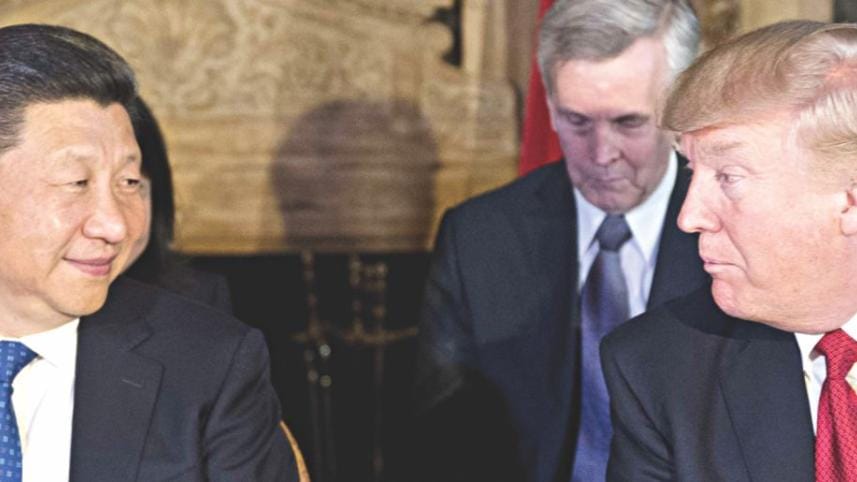A "China First" strategy for North Korea

Most pundits agree that the least bad way to deal with North Korea's nuclear sabre rattling is a continued combination of tight containment and aggressive diplomacy. Fewer, however, have recognised that the least bad military option—the one implied by US President Donald Trump's insistence that China take responsibility for its dangerous neighbour—is a Chinese invasion, or regime change forced through China's threat to launch one.
This outcome, which would sharply shift East Asia's strategic balance in China's favour, is not as unlikely as most people think. In fact, its very plausibility is one reason why it needs to be taken seriously, including by Chinese military planners. In Trumpian terms, this is a "China First" option that could help "Make China Great Again."
Any military intervention, Chinese or otherwise, would carry huge risks. But before dwelling on them, consider what a successful Chinese intervention would achieve. For starters, it would put North Korea right where the country's post-Korean War history suggests it belongs: under a Chinese nuclear umbrella, benefiting from a credible security guarantee.
Mao Zedong used to say that his country and North Korea were "as close as lips and teeth"—a fitting description, given Chinese troops' role in averting an American victory in the Korean War. But while Japan and South Korea have remained close allies of the United States during the six decades since then, hosting US bases and sheltering under US nuclear protection, China and North Korea have drifted ever further apart.
As a result, China has little control over its neighbour and purported ally, and probably scant knowledge of what is going on there. It could, it is true, tighten the existing siege on North Korea by cutting trade further and blocking energy supplies. But this might achieve little beyond pushing Kim Jong-un's cloistered regime to look for support from its other neighbour, Russia.
If, as is commonly assumed, North Korea wants some sort of credible security guarantee in exchange for curtailing its nuclear programme, the only country capable of providing it is China. No American promise would remain credible beyond the term of the president who gave it, if even that long.
So if China were to combine threats of invasion with a promise of security and nuclear protection, in exchange for cooperation and possible regime change, its chances of winning over large parts of the Korean People's Army would be high. Whereas a nuclear exchange with the US would mean devastation, submission to China would promise survival, and presumably a degree of continued autonomy. For all except those closest to Kim, the choice would not be a difficult one.
China's strategic gains from a successful military intervention would include not only control of what happens on the Korean Peninsula, where it presumably would be able to establish military bases, but also regional gratitude for having prevented a catastrophic war.
No other action holds as much potential to make Chinese leadership within Asia seem both credible, and desirable, especially if the alternative is a reckless, poorly planned US-led war. What China needs, above all, is legitimacy, and intervention in North Korea would provide it. Successful use of hard power would bring China, to borrow the distinction coined by Harvard's Joseph S Nye, huge reserves of soft power
But now to the 64 billion renminbi question: Could it work? We can't know the answer for sure, and any military intervention carries great risks. The Chinese armed forces are now well equipped, but lack comparable battlefield experience. Their inferior opponents have leaders who might be prepared to use nuclear weapons or other weapons of mass destruction, if they did not simply accept Chinese terms and surrender.
What we can say with near certainty is that a Chinese land and sea invasion, rather than an American one, would stand a better chance of avoiding Kim's likely response: an artillery attack on the South Korean capital, Seoul, which lies just a few dozen miles south of the demilitarised zone. Why would North Korea slaughter its southern brothers and sisters in retaliation for a Chinese invasion that came with a promise of continued security, if not autonomy?
Moreover, while the Kim regime's nuclear restraint could hardly be taken for granted, China would be a less likely target than the US for North Korean missiles. Were a Chinese military option to be contemplated seriously, some intelligence and missile-defence collaboration with the US might be worth exploring. Given the risks, it would be hard for the US to refuse.
This scenario may well never happen. But it is so logical that the possibility of it should be taken seriously. It is, after all, China's best opportunity to achieve greater strategic parity with the US in the region, while removing a source of instability that threatens them both.
Bill Emmott, is a former editor-in-chief of The Economist, is the author of The Fate of the West.
Copyright Project Syndicate, 2017.
www.project-syndicate.org
Exclusive to The Daily Star.

Comments